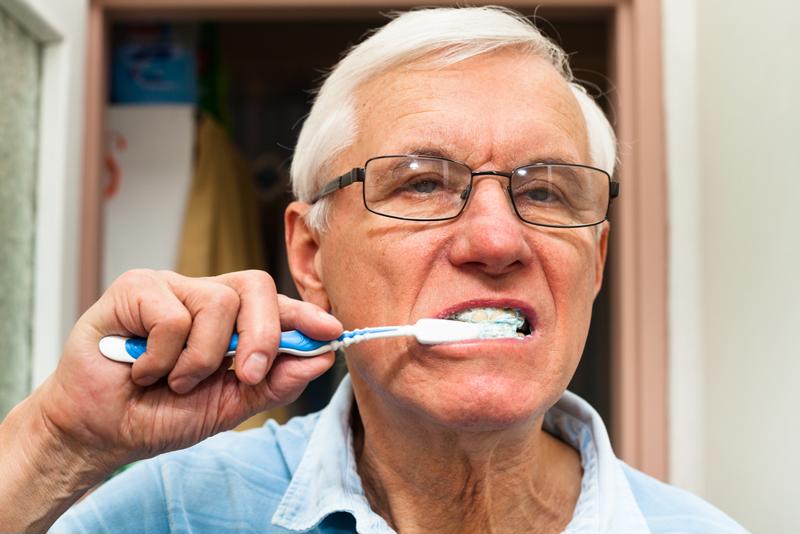Whether they’re over-the-counter whitening strips sold at local grocery stores or custom-made trays that form fit to the teeth, there are a wide variety of popular whitening strategies that can help to dial up the luminescence of you teeth. While some approaches work better than others, each is designed to complement the best practices — brushing and flossing — that keep teeth performing, feeling and looking their very best.
But what is the active ingredient that makes teeth whitening possible? This article will let you in on the not-so-secret ingredient that helps teeth attain their natural glow.
What is hydrogen peroxide?
Hydrogen peroxide is a naturally clear fluid that is used for a variety of needs, from wound healing to teeth whitening. While chemically it starts out as carbamide peroxide, which is composed of elements that are equal parts urea and hydrogen, it eventually turns into hydrogen peroxide when the substance is applied to the teeth and oxygen atoms lose some of their electrons.
How does hydrogen peroxide whiten teeth?
The whitening power that hydrogen peroxide delivers is all a function of chemistry. Essentially, when the substance is exposed to discoloured tooth enamel, caused by food, beverages like coffee and soda and the aging of teeth (exposing dentin that lies underneath enamel), it undergoes a chemical reaction that bleaches the surface of teeth over time and after several applications. How long this process takes depends on the concentration level of the hydrogen peroxide and the severity of staining on the teeth. Generally speaking, the higher the concentration of the gel, the shorter the time that’s required to start seeing results.
Is hydrogen peroxide the only way to whiten teeth?
If you’re active on social media, you’ve probably seen a variety of other remedies that claim to be every bit as effective as hydrogen peroxide. These include light therapy, baking soda, warm salt water and even certain types of foods that have a high water content, such as apples, strawberries or watermelon or cantaloupe.
All of these approaches are an at least somewhat effective way to bring added luster to teeth. But if you’re looking for a treatment that does it quickly, hydrogen peroxide is widely considered to be the best method. In fact, according to a U.S.-based study published in the Journal of the American Dental Association, hydrogen peroxide/carbamide peroxide teeth whitening solutions help to produce noticeably whiter teeth after as little as two weeks.
 Hydrogen peroxide is used in some toothpastes, but in low doses.
Hydrogen peroxide is used in some toothpastes, but in low doses.Are there any side effects to hydrogen peroxide?
The most common side effect linked to hydrogen peroxide, as it pertains to oral care, is tooth sensitivity. Depending on the solution, hydrogen peroxide comes in differing doses, where the gel is as little as 3% hydrogen peroxide or up to 40%. The higher the amount, the less time that it needs to be on the teeth to start producing results. But a higher concentration can also increase the sensitivity of the teeth compared to a solution that doesn’t have as much hydrogen peroxide.
You may notice the tooth sensitivity when brushing your teeth or when eating certain foods that are hot or cold. You may also feel some slight discomfort around the gumline. This is normal and should diminish over time. However, if the pain is severe and won’t go away after several days, reach out to your dentist to let them know.
This is one reason why your best move for whitening treatment is to go through your dentist. In addition to their knowing precisely the amount of hydrogen peroxide that’s needed to safely get your teeth several shades whiter, the trays you’ll receive are molded to your teeth. This will allow the gel to better adhere to your teeth so nothing is wasted and the results are maximised.
For how long can I expect my teeth to stay whiter?
The short answer is it depends. Again, generally speaking, a professional teeth whitening treatment can help teeth stay whiter for several years. But it’s also possible that your teeth could start to discolour sooner than that, perhaps even in six months or fewer from when you stopped using the hydrogen peroxide.
What influences the time factor is how often you brush and floss, how effectively you clean your teeth and the food and beverages you select. For example, if your diet includes a lot of intense colours like beetroot, marinara sauces, coffee or colas, the whitening won’t last as long compared to a diet containing more clear liquids and foods with a high water content, like fruits and vegetables.
City Dentists at Wellington is your one-stop office for effective dental care, which includes teeth whitening. Contact us today to learn more or schedule an appointment online.
